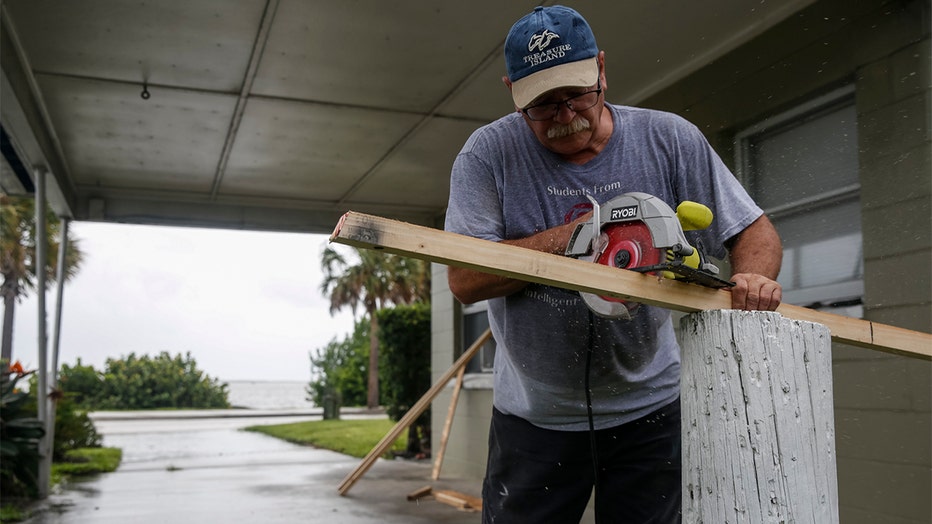How homeowners can start to recover from hurricane damage
NEW YORK (AP) - With the National Hurricane Center warning that Dorian could inflict destructive storm surges and dangerous winds along the coasts of Florida, Georgia and the Carolinas, billions of dollars in damage could be caused to homes and other property in its path.
Insurance industry experts say there are a number of things homeowners need to consider when the time comes to assess the material damage in the wake of a major hurricane.
MY HOME WAS DAMAGED, WHAT DO I DO FIRST?
When it's safe to do so, make any temporary repairs to prevent further damage to your home or property. That could be something as simple as putting a tarp over a hole in the roof or plywood over a broken window.It's important to document as much as possible to ease your claim process, so take photos or videos of damage and save all receipts for supplies purchased for repairs.
Try to get the claims process started as quickly as possible by contacting your insurance company, although many insurers will reach out to affected policyholders directly. Most major insurers send disaster teams to the affected area to start the process in person, but claims can also begin on the phone or online.
WHAT IS COVERED BY MY INSURANCE POLICY?
A storm of Hurricane Dorian's magnitude may necessitate making claims through multiple insurance policies.
The exact limits of your coverage depend on your policy but they follow a general framework: Property damage from wind is covered under standard homeowners, renters and business insurance policies, according to the Insurance Information Institute.
But flood damage isn't covered through a standard homeowners' policy.
That is traditionally separate coverage purchased through the federal government's National Flood Insurance Program, although some homeowners may have purchased flood coverage through private insurers.Renters' policies cover only the renters' possessions; the landlord insures the building's structure.
Damage to a personal vehicle from winds and flooding is covered under an auto insurance policy's optional comprehensive coverage, according to the Insurance Information Institute. The industry group said that nearly 80% of U.S. drivers choose to purchase comprehensive coverage.
Ask your insurance agent or claims representative for details on your coverage and limits.

Michael James works to board the windows of his home as clouds from hurricane Dorian move in over Jensen Beach, Florida on September 2, 2019. (Photo by ADAM DELGIUDICE/AFP/Getty Images)
WHAT OTHER EXPENSES FROM THIS EVENT ARE COVERED?
Again, the limitations depend on your policy but many homeowners' policies typically help cover costs beyond just damage to a structure or belongings. Ask your insurance representative about help paying for the costs of evacuation, temporary housing if your home is uninhabitable or damage to a structure caused by fallen trees or flying debris.
Additionally, if you are worried about lost wages because of missed days at work, talk to your employer. Many businesses have insurance policies that include a provision called "ordinary payroll" that allows them to pay employees for a set number of days when they are forced to miss work due to mandatory evacuation.
CAN I GET HELP FROM FEMA?
The Federal Emergency Management Agency provides various forms of financial assistance after a disaster but it must be declared a federal disaster first.
To find out if you qualify for individual assistance, visit https://www.disasterassistance.gov (https://www.disasterassistance.gov/) and enter your address. The site can also point you toward FEMA Disaster Recovery Centers, which are mobile offices set up after a disaster to help those in the area, and other resources.
HOW DO AVOID GETTING SCAMMED ON REPAIRS?
Be wary of sales representatives or contractors going door-to-door soliciting business. If you have any questions about their legitimacy, contact your local Better Business Bureau or check out their reputation through online clearinghouses such as Angie's List or Yelp. Also:
— Contact your insurance company before signing a contract for repairs to your home.
— Only work with licensed and insured contractors.
— Get more than one estimate. Don't be pushed into signing a contract right away.
— Get everything in writing, including the cost of labor and materials, and a work schedule with a completed date.
— Get IDs from sales representatives. Write down the representative's name, driver's license number and license plate number in case problems arise.
— Never pay a contractor in full or sign a completion certificate until the work is completed.
If you think you're being scammed or want to report suspected fraud, contact your state's department of insurance.

